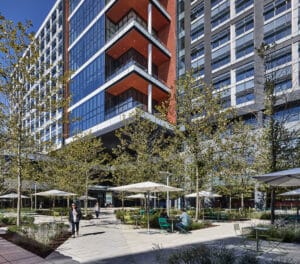
At the new Somerville administrative campus completed in 2016 for Partners HealthCare, now Mass General Brigham, abundant outdoor spaces including terraces, a rooftop garden and landscaped courtyards provide alternative places to meet or work. Photo courtesy of Gensler
Despite speculation by some that work-from-home is here to stay, even after COVID-19 restrictions are lifted, there are many indications that full-time remote work is neither sustainable nor strategic for the long-term health of companies and their people.
The office is vital in many ways to the success of our organizations, from supporting critical business functions and leadership alignment to promoting cross-functional collaboration. Moreover, there is a heightened awareness of the irreplaceable role of the office as an organizational hub – for culture, for developing talent, and for informal learning and mentoring.
As expectations around work evolve, architects and designers are rethinking how office buildings and workplaces will function in the future. The global pandemic has notably elevated the importance of human health and wellness, and the environmental impact of the built environment. Below are considerations for creating more resilient office buildings and relevant workplaces that support a renewed focus on the health of our people, our communities and our environment.
Cultural Incubator and Community Hub
The Gensler Research Institute surveyed over 2,300 U.S. workers across 10 different industries and found that 70 percent want to return to the office the majority of their week. The overwhelming reason was people want the social connection of being with their peers. While advanced technology has enabled successful virtual collaboration, people still value face-to-face interactions and chance encounters that happen every day in office settings. It is the moments between formal meetings and calls that catalyze ideas and innovation, foster personal connections and build office culture. Studies also show that social belonging contributes to workplace satisfaction.
During a time when our workplace ecosystem is evolving – with work happening everywhere – the office must become the embodiment of nimbleness. To enable individual and team performance, we must provide an environment purposefully designed to promote relationship-building, effective teaming and rapid and efficient ideation. Multi-floor hubs of social and collaborative spaces foster community-building and encourage spontaneous connections with colleagues. As we prioritize community and social interaction, we also anticipate a decreased demand for spaces designed specifically for focused task work.
Office buildings should not be insular micro-communities of tenants but rather macro-communities of organizations. They should be rooted in the broader community and the city, and a contributing part of a larger network of spaces and places for work and social interaction.
Priotize Workplace Well-Being
People spend more than 90 percent of their time indoors. Building designs that prioritize natural light and air quality can positively impact the health and wellness of occupants. The pandemic has sparked new industry focus on breathable facades, operable windows and optimized buildings systems, knowing that ventilation and fresh air not only help maintain healthier environments but also mitigate person-to-person transmission of viruses. In addition, office environments with ample outdoor meeting and focus spaces that function rain or shine will take on new importance as critical amenities.
The pandemic has also spurred a renewed focus on employee well-being and healthy lifestyles. Successful office buildings will offer health-conscious amenities and “one-stop” services that will allow workers to streamline their daily lives, including on-site retail, fitness and food and beverage amenities as well as integrated technology services such as digital concierge and built-in conferencing.

Doug Gensler
Widespread reliance of working from home during the pandemic has prompted companies to evaluate the impact of remote work on productivity and organizational performance. The experience has opened the eyes of many to the possibility of a new workplace strategy that may include increased flexibility in where and how we work. Providing employees with choice can have positive effects on mental and physical health by reducing the stress of commuting and increasing opportunities for work/life balance.
The pandemic has underscored that we can achieve cleaner air, cleaner water and a healthier planet, providing a unique opportunity to reposition our mindsets on sustainable behavior going forward. Environmental threats are

Todd Dundon
likely to have an even larger impact on our lives over an even longer timespan than pandemics. More than ever, it is critical that we consider the impact of buildings on the environment as we design for a ‘new normal’ post-COVID.
If the vision is to create a better world, we must use this experience to reflect on our priorities and think about ways that we can advance the value proposition of the buildings and the spaces we create to enhance the human experience while making our built environment more sustainable, resilient and more purposeful.
Douglas Gensler is principal and co-managing director and Todd Dundon is a principal and work sector leader for Gensler Boston.





